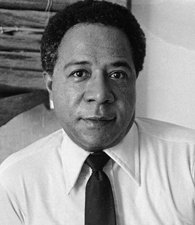Characterized by his slow, honeyed voice, Alex Haley was one of America’s most popular oral and written storytellers. His timeless novel “Roots” illuminates and humanizes America’s era of slavery and ultimately reflects the personal mantra visible in all his work: “Find the good and praise it.”
Alex Haley’s Early Days
Alexander Murray Palmer Haley was born on August 11, 1921, to Simon Alexander, a professor who took over the family’s business, and Bertha Palmer Haley, a music teacher. Haley’s mother passed away when he was 10 years old and the family moved from Ithaca, New York, to Henning, Tennessee, to live with relatives.
During this time Haley listened that his grandmother tell vibrant stories about their family’s ancestry. She spoke about “Kin-tay,” one of his grandfathers tracing back seven generations, whom she said was sold into slavery with other Gambian Africans in “Naplis” (Annapolis, Maryland).
Although he was considered a lax student, he graduated from high school at the age of 15. When he turned 17, he entered the U.S. Coast Guard, serving for the next 20 years. To alleviate his boredom, he wrote love letters on behalf of his shipmates to send to their wives and girlfriends. He moved toward writing more professional pieces, which he submitted to magazines and newspapers, launching his writing career. Eventually, a new position was created for Haley; he was appointed chief journalist and manager for U.S. Coast Guard public relations.
Sources in this Story
- The Kunta Kinte–Alex Haley Foundation: Alex Haley
- United States Coast Guard: Alexander Palmer Haley, Chief Journalist, USCG (Ret.)
- Time: Why ‘Roots’ Hit Home
- Time: Roots’ Roots
- The Genealogue: Roots Revisited
- The Knoxville History Project: The Redemption of Alex Haley
- The New York Times: Alex Haley, 70, Author of ‘Roots,’ Dies
- The New York Times: The Tangled Roots of Alex Haley
Haley’s Writing
After retiring from the Coast Guard, Haley continued as a journalist, and interviewed cultural icons for Playboy Magazine, including Martin Luther King Jr., Cassisus Clay (aka Muhammad Ali), Sammy Davis Jr. and Miles Davis. His interview with Malcolm X prompted the two to collaborate on “The Autobiography of Malcolm X,” which was translated into eight languages and sold more than 8 million copies.
Over the course of nearly three decades, Haley’s personal journey took him through three countries in an effort to trace his maternal family back to the small Gambian village of Juffure. During this period, he became a prolific lecturer at various universities and continued to write magazine articles, sharing what he learned about his family’s history in relation to slavery.
His genealogical research culminated in 1976 with the publication of “Roots: The Saga of an American Family,” a portrayal of his ancestors’ passage into slavery from their home in West Africa, and their struggle for freedom.
The Pulitzer Prize-winning novel was adapted into a television miniseries, which aired eight nights in a row and drew over 80 million viewers. “Roots” was an overnight phenomenon and is considered to be “a potentially important bench mark in U.S. race relations,” wrote Time.
The Controversy Over “Roots”
The authenticity of “Roots” has been repeatedly questioned, and Haley’s reputation has suffered. In 1978, Haley was sued by author Harold Courlander, who claimed that Haley had plagiarized 81 passages from Courlander’s 1967 book “The African.” Haley admitted to unknowingly using several passages and settled for $650,000.
Research by historians and genealogists have found Haley’s narrative to be historically inaccurate. Elizabeth Shown Mills and Gary B. Mills, writing in a 1984 issue of National Genealogical Society Quarterly, presented several significant errors, including that slave purported to be Kunta Kinte died more than 20 years before the birth of Kizzy, his daughter in the novel.
In 1993, a year after Haley’s death, Philip Nobile of the Village Voice examined Haley’s archives and found evidence that he had fabricated the events in “Roots.” “Beyond the plagiarism and the massive perjury to cover it up, Roots as Haley well knew was a hoax, a literary painted bird, a Piltdown of genealogy, a pyramid of bogus research,” Nobile wrote. Robert J. Norrell, a University of Tennessee professor, worked to rehabilitate Haley’s reputation, arguing that “Roots” helped black and white Americans better understand black history.
Others agree that “Roots” has value for its significant impact on American culture. “No doubt that during an important period in our history, Roots helped give white Americans sympathy for what black Americans had suffered in bondage,” wrote Harvard professor Richard Marius. “Unfortunately, the book will be remembered as a phenomenon of popular culture rather than as a serious and enduring study of black history.”
Haley’s Work
- “The Autobiography of Malcolm X: As Told to Alex Haley”
- “Alex Haley: The Man Who Traced America’s Roots: His Life, His Works”
Haley’s Death
Following the success of “Roots,” Haley starting working on the story of his paternal grandmother, Queen. But before he could finish the work, on February 11, 1992, Alex Haley died of a heart attack in Seattle. “Queen” was completed by Australian writer David Stevens and made into a miniseries.
Following his death, his farm in Clinton, Tennessee, was sold to Marian Wright Edelman’s Children’s Defense Fund, and still exists as a training and retreat center for youth workers. His legacy continues, the stories he shared are just as relevant today as the words he left behind: “We all suffer. If a man’s wise, he learns from it.”











